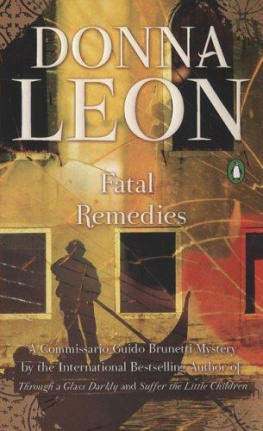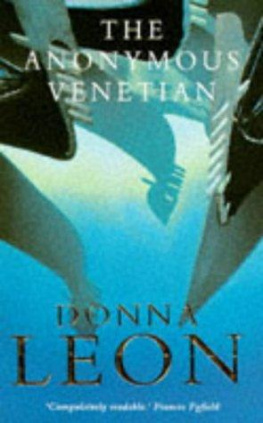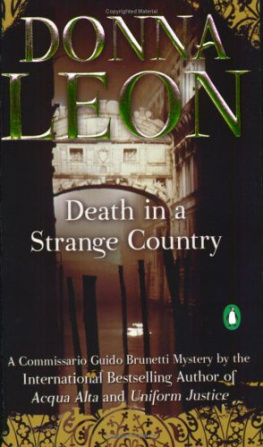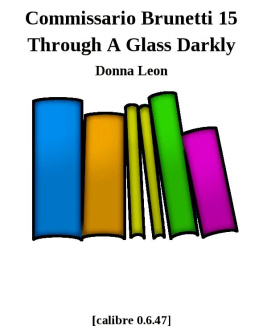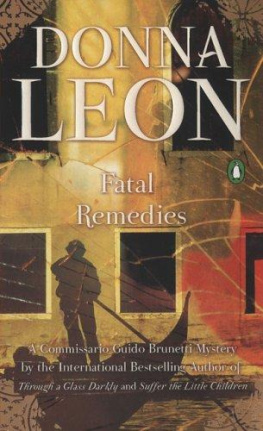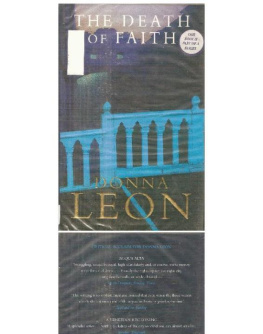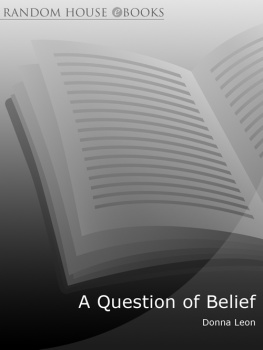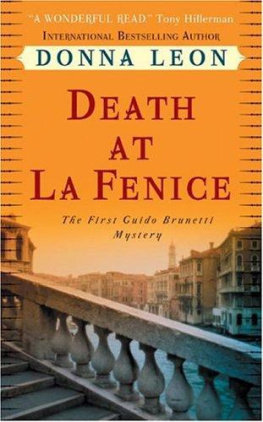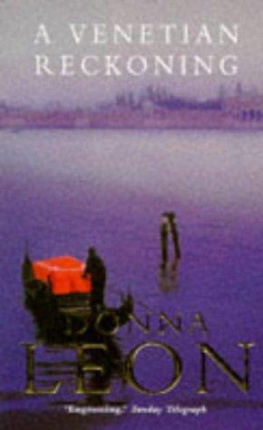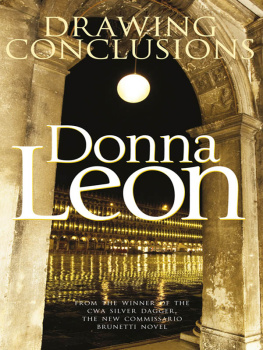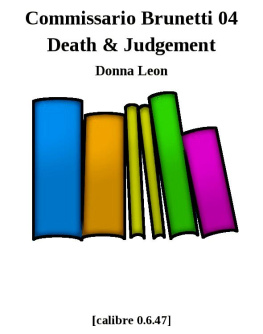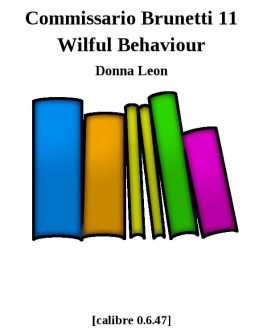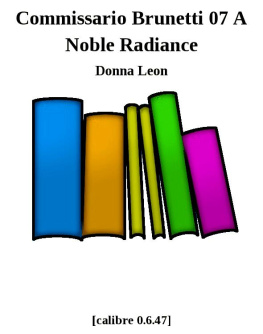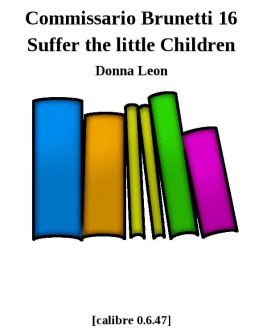Donna Leon - Fatal remedies
Here you can read online Donna Leon - Fatal remedies full text of the book (entire story) in english for free. Download pdf and epub, get meaning, cover and reviews about this ebook. year: 1999, publisher: Arrow, genre: Detective and thriller. Description of the work, (preface) as well as reviews are available. Best literature library LitArk.com created for fans of good reading and offers a wide selection of genres:
Romance novel
Science fiction
Adventure
Detective
Science
History
Home and family
Prose
Art
Politics
Computer
Non-fiction
Religion
Business
Children
Humor
Choose a favorite category and find really read worthwhile books. Enjoy immersion in the world of imagination, feel the emotions of the characters or learn something new for yourself, make an fascinating discovery.
- Book:Fatal remedies
- Author:
- Publisher:Arrow
- Genre:
- Year:1999
- Rating:4 / 5
- Favourites:Add to favourites
- Your mark:
- 80
- 1
- 2
- 3
- 4
- 5
Fatal remedies: summary, description and annotation
We offer to read an annotation, description, summary or preface (depends on what the author of the book "Fatal remedies" wrote himself). If you haven't found the necessary information about the book — write in the comments, we will try to find it.
Fatal remedies — read online for free the complete book (whole text) full work
Below is the text of the book, divided by pages. System saving the place of the last page read, allows you to conveniently read the book "Fatal remedies" online for free, without having to search again every time where you left off. Put a bookmark, and you can go to the page where you finished reading at any time.
Font size:
Interval:
Bookmark:


* * * *
Fatal Remedies
[Commissario Brunetti 08]
By Donna Leon
Scanned & Proofed By MadMaxAU
* * * *
Di questo tradimento
Chi mai sarIautor?
Of this treachery,
Who could be the author?
La Clemenza di Tito
Mozart
* * * *
The woman walked quietly into the empty campo. To her left stood the grill-covered windows of a bank, empty and sleeping the well-protected sleep that comes in the early hours of the morning. She crossed to the centre of the campo and stood beside the low-hung iron chains enclosing the monument to Daniele Manin, who had sacrificed himself for the freedom of the city. How fitting, she thought.
She heard a noise to her left and turned towards it, but it was nothing more than one of the Guardia di San Marco and his German shepherd, a gap-mouthed dog that looked too young and too friendly to present any real threat to thieves. If the guard thought it strange to see a middle-aged woman standing still in the middle of Campo Manin at three fifteen in the morning, he gave no sign of it and went about his business of wedging orange paper rectangles into the frames of doors and near the locks of the shops, proof that he had made his rounds and found their premises undisturbed.
When the guard and his dog left, the woman moved away from the low chain and went to stand in front of a large glass display window on the far side of the square. In the dim light from inside she studied the posters, read the prices listed for the various special offers, saw that MasterCard, Visa, and American Express were all accepted. Over her left shoulder, she carried a blue canvas beach bag. She pivoted her body and the weight of what was in the bag swung it round to the front. She set it on the ground, glanced down into it, and reached in with her right hand.
Before she could remove anything, she was so startled by footsteps from behind her that she yanked her hand from the bag and stood upright. But it was nothing more than four men and a woman, just off the number 1 boat that stopped at Rialto at three fourteen, now crossing the campo on their way to some other part of the city. None of them paid any attention to the woman. Their footsteps died away as they walked up, then down the bridge that led into Calle della Mandola.
Again, she bent and reached into the bag and this time her hand came out with a large rock, one that had stood for years on the desk in her study. Shed brought it back from a vacation on a beach in Maine more than ten years before. The size of a grapefruit, it fitted perfectly into her gloved palm. She looked down at it, raised her hand, even tossed the stone up and down a few times, as if it were a tennis ball and her turn to serve. She looked from the rock to the window and again to the rock.
She stepped back from the window until she was about two metres from it and turned until she stood sideways, but still looking at the window. She pulled her right hand back level with her head and raised her left arm as counterweight, just as her son had taught her to do one summer when he had tried to teach her to throw like a boy, not a girl. For an instant it occurred to her that her life, at least part of it, would perhaps be divided in half by her next action, but she dismissed the idea as melodramatic self-importance.
In one sweeping motion she brought her hand forward with all her strength. At the full extension of her arm she released the rock, then staggered forward a half-step, powerless to resist the momentum of her own motion. Because the step pulled her head down, the fragments of glass that exploded from the shattering window landed in her hair and did her no injury.
The stone must have found some inherent fault line in the glass, for instead of punching out a small hole its own size, it shattered open a triangle two metres high and almost as wide. She waited until there was no more sound of falling glass, but that had no sooner stopped than from the back room of the office in front of her the sharp double-wail of a burglar alarm blared out into the silent morning. She stood upright and plucked absently at the shards of glass that stuck to the front of her coat, then shook her head wildly, as if just rising up from under a wave, to free it of the glass she could feel trapped there. She stepped back, picked up her bag and placed the straps over her shoulder, then, suddenly aware of how weak her knees had become, went and sat on one of the low pillars that anchored the metal chains.
She hadnt really considered what the hole would be like, but she was surprised to see it was so big, large enough for a man to walk through. Cobwebs in the shattered glass ran from the hole towards the four corners; the glass around the hole was milky and opaque, but the sharp shards that pointed inward were no less dangerous for that.
Behind her, in the top-floor apartment to the left of the bank, lights went on, then in the one that stood directly above the still wailing alarm. Time passed, but she was curiously uninterested in it: whatever was going to happen would happen, no matter how long or short a time it took for the police to get there. The noise bothered her, however. Its sharp double bleat destroyed the peace of the night. But then, she thought, thats what all this is about, the destruction of peace.
Shutters were flung out, three heads appeared and as quickly disappeared, more lights came on. Sleep was impossible so long as the alarm continued to scream out that crime was afoot in the city. After about ten minutes two policemen came running into the campo, one with his pistol in his hand. He went to the hole in the shattered window and called out, Whoevers in there, come out. This is the police.
Nothing happened. The alarm continued.
He called out again, but when there was still no response he turned to his partner, who shrugged and shook his head. The first one put his pistol back into its holster and moved a step closer to the shattered window. Above him, a window opened and someone called out, Cant you turn that damn thing off? Then another angry voice called down, I want to get some sleep.
The second policeman approached his partner and they peered in together, then the first raised a foot and kicked away the tall stalagmites of glass that rose up dangerously from the base of the frame. Together they climbed inside and disappeared into the back. Minutes passed and nothing happened. Then, in the same instant, the lights in the office went out and the alarm stopped.
They came back into the main room, one of them now leading the way with a flashlight. They looked around to see if anything appeared to be missing or destroyed, then stepped back through the hole in the window into the campo. It was then that they noticed the woman sitting on the stone pillar.
The one who had pulled out his pistol went towards her. Signora, did you see what happened?
Yes.
What? Who was it? Hearing his questions, the other policeman came up and joined them, pleased that they had so easily found a witness. That would speed things up, prevent their having to ring doorbells and ask questions, get them a description and out of this damp autumn cold, back to the warmth of the Questura to write up the report.
Who was it? the first one asked.
Someone threw a rock through the window, the woman said.
What did he look like?
It wasnt a man, she answered.
A woman? the second one interrupted and she stopped herself from asking if there were perhaps some other alternative she didnt know about. No jokes. No jokes. There were not going to be any more jokes, not until all this was over.
Next pageFont size:
Interval:
Bookmark:
Similar books «Fatal remedies»
Look at similar books to Fatal remedies. We have selected literature similar in name and meaning in the hope of providing readers with more options to find new, interesting, not yet read works.
Discussion, reviews of the book Fatal remedies and just readers' own opinions. Leave your comments, write what you think about the work, its meaning or the main characters. Specify what exactly you liked and what you didn't like, and why you think so.

